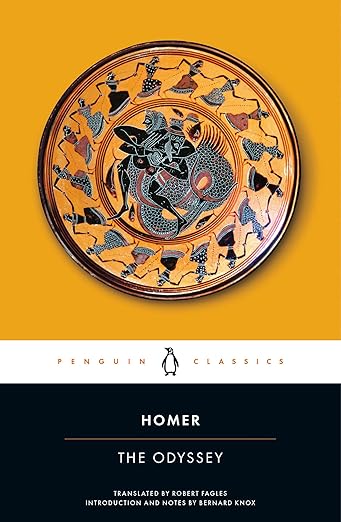Welcome back, fellow readers! Today, we’re diving into one of the greatest epic poems ever written: The Odyssey by Homer. This ancient Greek tale has captivated audiences for centuries with its adventure, heroism, and rich storytelling. Let’s set sail on this literary journey together!
Introduction
The Odyssey is a cornerstone of ancient Greek literature and one of the earliest works of Western storytelling. Believed to have been composed around the 8th century BCE, this epic poem recounts the adventures of Odysseus as he journeys home to Ithaca after the Trojan War. It explores themes of loyalty, perseverance, and the quest for identity while reflecting the values and beliefs of ancient Greek society. Join us as we embark on a deep exploration of this timeless classic.
Quick Summary
The Odyssey follows the hero Odysseus, king of Ithaca, who faces a perilous ten-year journey to return home after the fall of Troy. During his voyage, Odysseus encounters numerous challenges, including mythical creatures, divine interventions, and the wrath of Poseidon, the god of the sea. Meanwhile, his wife Penelope and son Telemachus struggle to fend off suitors vying for Penelope’s hand, believing Odysseus to be dead. The story unfolds through a series of adventures, highlighting Odysseus’s cunning, bravery, and determination to reunite with his family.
Character List and Descriptions
Odysseus: The protagonist of the epic, Odysseus is a complex hero known for his intelligence, cunning, and resourcefulness. Throughout his journey, he demonstrates both great physical strength and moral fortitude but is also susceptible to pride and temptation.
Penelope: Odysseus’s faithful wife, Penelope is a paragon of loyalty and patience. Despite being pursued by numerous suitors, she cleverly delays remarrying by weaving and then unraveling a shroud, hoping for her husband’s return.
Telemachus: The son of Odysseus and Penelope, Telemachus grows from a passive young man into a brave and assertive figure. His journey to find news of his father marks his coming-of-age.
Athena: The goddess of wisdom and war, Athena plays a crucial role as Odysseus’s divine protector. She assists both Odysseus and Telemachus, guiding them through their challenges.
Poseidon: The god of the sea and antagonist to Odysseus, Poseidon is angered by Odysseus blinding his son, the Cyclops Polyphemus, and seeks to thwart his journey home.
Calypso: A nymph who falls in love with Odysseus and keeps him on her island, Ogygia, for seven years, Calypso eventually lets him go after being ordered by Zeus.
Circe: A witch who initially turns Odysseus’s men into swine but later becomes his ally. She advises him on the dangers ahead and helps him on his journey.
Polyphemus: The Cyclops and son of Poseidon who imprisons Odysseus and his men. Odysseus blinds Polyphemus to escape, incurring Poseidon’s wrath.
Themes
Heroism and the Hero’s Journey: Central to The Odyssey is the theme of heroism, illustrated through Odysseus’s many adventures and challenges. His journey epitomizes the archetypal hero’s journey, filled with trials, tribulations, and personal growth.
Loyalty and Perseverance: Loyalty is a key theme, particularly embodied by Penelope’s faithfulness to Odysseus and Odysseus’ determination to return to his family. Perseverance is also crucial as Odysseus overcomes seemingly insurmountable obstacles to achieve his goal.
The Power of Cunning Over Strength: Throughout the epic, Odysseus frequently uses his wits rather than brute force to overcome obstacles, emphasizing the value of intelligence and cunning in Greek culture.
Fate vs. Free Will: The Odyssey explores the tension between fate and free will, as the gods often intervene in human affairs, yet characters still exercise personal agency in their decisions.
The Importance of Home and Family: The desire for homecoming, or “nostos,” is a driving force for Odysseus. His yearning to return to Ithaca and reunite with his family underscores the epic’s emphasis on the importance of home and family ties.
Conclusion
The Odyssey is more than just a tale of adventure; it’s a profound exploration of human nature, the power of resilience, and the pursuit of one’s destiny. Through its rich characters and timeless themes, this epic continues to resonate with readers, offering valuable lessons about life, loyalty, and the human spirit. Thank you for joining us on this literary voyage!
Looking for more insights and resources? Stay tuned for more literary guides and discussions right here. Happy reading!

